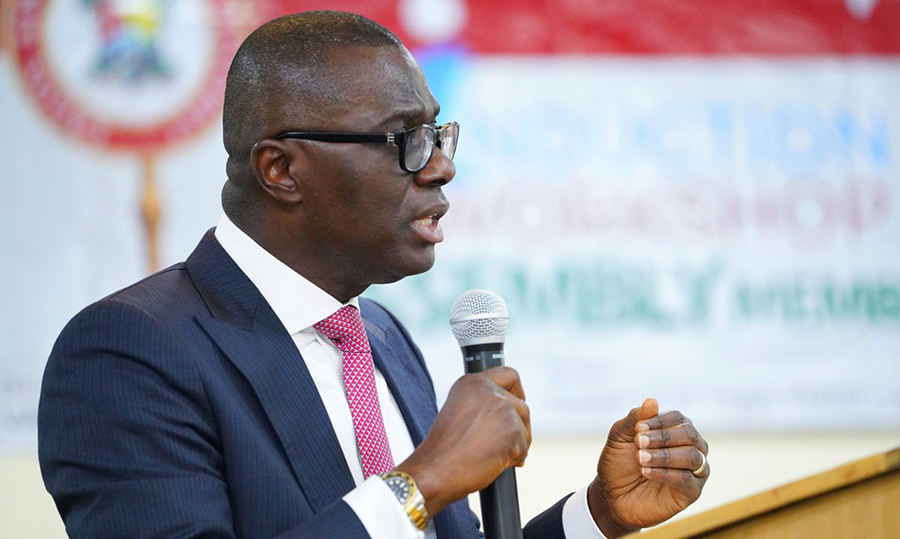The Lagos State Government has moved to reduce vulnerability to food shortages and guarantee uninterrupted food supplies as it has flagged off the construction of what will be the largest Food Security Systems and Central Logistics Park in sub-Saharan Africa.
The groundbreaking ceremony was performed on Wednesday by Governor Babajide Sanwo-Olu, at the site of the facility being built on 1.2 million square metres of land in Ketu-Ereyun, Epe.
The establishment of the food park is a component of an audacious 5-year Agricultural and Food Systems Road Map (2021–2025) launched in 2021 by the Sanwo-Olu administration to enhance food sufficiency in Lagos.
To create wealth for over 5 million traders, guarantee food supplies to over 10 million Lagosians
The central food and logistics hub is expected to create direct wealth for more than 5 million traders in the agricultural value chain when completed, while also guaranteeing uninterrupted food supplies to more than 10 million Lagosians, at least 90 days, in a period of scarcity.
Transactions on food items in Lagos are estimated to be N5 trillion yearly, just as farmers daily lose 40% of produce worth millions due to lack of post-harvest storage system.
What the Lagos State Governor is saying
Governor Sanwo-Olu said the central food hub would guarantee greater returns for farmers and investors in the agro-allied sector, as the facility would cut out several layers of middlemen and facilitate improved access to modern processing and packaging services.
He pointed out that market matrix generated from the facility would help the Government generate useful data for public planning and for the use of private sector players to project investment.
He said, “Today’s flag-off of the Food Security Systems and Central Logistics Park is proof of our administration’s commitment to addressing the challenges of stakeholders in the Agri-space and giving hope to the people through improved quality of life. I make bold to say this is one of the most important interventions in agricultural sector that Nigeria has ever seen. The fact that this project is taking off in Lagos, the fastest-growing sub-national entity, means that it is bound to have significant national, regional, and continental impact.
“This hub will provide a better buying experience for consumers, help achieve a reduction in logistics costs, while guaranteeing the standardisation of quantity and quality for agricultural products. It also will improve productivity, guarantee greater returns for farmers, by cutting out several layers of middlemen. It will facilitate improved access to modern processing and packaging services for farmers and generate useful data for the use of government agencies, private sector players, and multilateral agencies.”
Project to be completed in 2024
Sanwo-Olu said the choice of the location for the project was strategic, given its easy access and proximity to agrarian settlements. He said the State had secured a well thought out funding scheme to kick off the project, which he promised will be delivered in last quarter of 2024.
He explained that the Lagos agricultural road is expected to take full advantage of all value chains in which the State has competitive and comparative advantages, with a view to scale up self-sufficiency in food production from 18 to 40%.
The Governor said the hub, when completed, would add to the catalogue of life-changing projects sited within Epe Division, which include 32-metric tons per hour Rice Mill in Imota, Agbowa-Ikosi Timberville, and Ketu-Ereyun Psychiatric Hospital, among others.
Speaking at the occasion, the Lagos State Commissioner for Agriculture, Abisola Olusanya, said the current global food shortages were parts of the harsh consequences of climate change and global warming, which, he said, had led to economic instability in some countries.
She said, “Upon completion, the Central Food and Logistics Park will unleash the potential in both the upstream and downstream of agricultural sector. This project will further reaffirm the leadership of Lagos as the first destination for agricultural produce along the West African corridor.’’
The project partner, Origin Group, assured the first phase of the project, which requires building storage facilities, would be delivered in the next 7 months.
The hub will be operated on off-grid power source of 900 megawatts, and is expected to provide 16,000 direct jobs















It is good to make promises and give timeline commitments, so much of these are tracked and adhered to?
Can Nairametrics showcase a report on this, for instance YTD or last 2 years and categorize them into Sectors and Government space (FGN, SGN, LGN).
Tracking accountability should help our Leaders increase their tempo at keeping to their words.